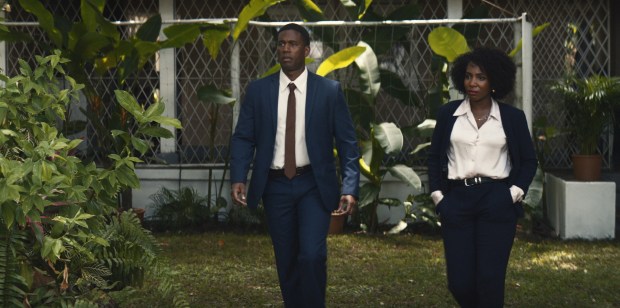A police detective in Jamaica works to track down a missing teenage girl and the case proves to be more complicated — and dangerous — than anticipated in the five-episode HBO drama “Get Millie Black.” A sunbaked noir, the series is from Jamaican-born, Minnesota-based novelist Marlon James.
Though a fairly conventional cop show, the Kingston setting is a refreshing change visually and culturally. Starring Tamara Lawrance as the title character, Millie was banished to England as a child, where she lived her entire adult life until learning her younger brother — who she thought was dead — is very much alive.
That’s enough to pull her home again. Millie is smart and driven and she bucks authority. She also has all kinds of emotional baggage that returns with her to Jamaica. Her sibling, she soon realizes, has transitioned and is now named Hibiscus (a terrific Chyna McQueen, vulnerable and sharp).
But Hibiscus has little interest in Millie’s efforts to reconnect, in part because the latter insists on living in their childhood home, where so much abuse once filled the rooms. “My sister would rather live in a gutter than with me,” Millie laments, but that’s not the full story. Hibiscus doesn’t want to live in that house, where the memories linger like a bad smell. And anyway, in the years since they’ve been separated, she’s found a nurturing if precarious community of her own, made up of fellow transgender sex workers. Millie escaped her mother’s wrath when she was sent away. Hibiscus wasn’t so lucky and this has left a gulf between them, as if they hold one another responsible for how their childhoods played out.
Anger, exasperation and guilt preoccupy Millie when she’s not at work. But it’s also why she’s so fixated on the case of the missing teen. “If you didn’t know me, you’d say I was just doing my job,” she says in a voiceover. “Nobody knew I was paying an unpayable debt to a ghost.” It’s an old cliche; becoming a cop means trying to make up for a past she can not change.
Working with her partner (the quietly droll Gershwyn Eustache Jnr), Millie’s investigation leads them to one of the richest white families in Kingston. “Behind every old white family is the ghost of a slave,” she thinks to herself as they drive through an Uptown neighborhood. That kind of tension is underscored when a white detective from Scotland Yard arrives (Joe Dempsie), hoping to get in on the case as well. The family in question is involved in child trafficking and it’s initially unclear whether this interloper from across the pond will be a help or a hindrance to Millie’s efforts to unravel it all. “Scotland Yard is watching, you’ve got to do everything by the book,” warns Millie’s boss, and that old mindset borne of Jamaica’s colonial past is yet another ghost hovering at the edges. Having worked at Scotland Yard herself, Millie is unimpressed.
The show’s creator is probably best known for his Booker Prize-winning novel “A Brief History of Seven Killings,” about the attempted assassination of Bob Marley. Here, James is drawing inspiration from his own mother, who worked as a police detective in Jamaica. Even so, and despite the uniqueness of the setting rarely featured on U.S. television, the overall contours of a character like Millie are similar to that of “Prime Suspect’s” Jane Tennison or any other police detective who is a dogged investigator with an unstable personal life. That’s likely a selling point for audiences looking for something new but familiar.
And on those terms, “Get Millie Black” is worthwhile. Lawrance is a compelling screen presence who is able to carry the show’s emotional weight on her shoulders. And the show itself is atmospheric and finds room for the occasional wry line of dialogue. “I need a big favor,” Millie says to an old colleague. “That’s the only size you know,” comes the reply.
“Get Millie Black” — 2.5 stars (out of 4)
Where to watch: 8 p.m. Mondays on HBO (streaming on Max)
Nina Metz is a Tribune critic.




